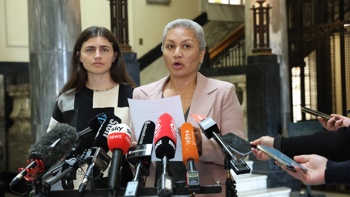Auckland Council and the Government are discussing plans for a new national stadium in downtown Auckland costing between $1.1 billion and $1.5b.
The surprise move comes 12 years after the city turned down a Government offer to build a waterfront stadium for the 2011 Rugby World Cup.
In an exclusive interview with the Weekend Herald, Auckland Mayor Phil Goff said a pre-feasibility study by PwC established a rectangular football stadium in downtown Auckland could be built in one of six locations.
The stadium would have a retractable roof and could be configured for 25,000 spectators at Super Rugby and NRL matches with a curtain on the top stands to create an atmosphere. It would seat 50,000 to 55,000 spectators for All Black tests and other international matches.
The stadium would also become the main venue for big concerts in the city, capable of holding 65,000 fans.
"We need to plan for the future. It's about what we want Auckland and New Zealand to look like in 10, 20, 30 years' time," Goff said.
Of the six unidentified sites for a new downtown stadium, Goff has previously expressed a preference for railway land alongside Spark Arena, which is close to the city's main train, bus and ferry services, the motorway network, and bars and restaurants.
The site does, however, have some complex hurdles, including building a 40m-high stadium on land with an 18m height limit, protected volcanic viewshafts to the Auckland Museum and Parnell, and rail and port access considerations.
It is also a tight footprint for a stadium and could involve realigning The Strand or Quay St.
Warriors chief executive Cameron George said the club was committed to its home at Mt Smart until the end of the 2028 season.
"In terms of beyond that, as we have said all along from the Warriors' point of view the possibility of a new, state-of-the-art stadium in the CBD is an exciting prospect. We would be interested in hearing more detail," George said.
Goff said he had discussed the plan with Sports Minister Grant Robertson, saying the two politicians had agreed it would be a good idea to start planning. They had also talked about funding options, but acknowledged they both have more pressing priorities at present, he said.
"Can we magic up $1.5b? The answer is no," Goff said.
But the mayor said at the point at which Auckland hosts another major international event like the Rugby World Cup or Commonwealth Games, likely in the 2030s, the council and Government will need to consider a national stadium.
Goff also revealed he had been approached by a private sector, New Zealand-based consortium to put up money, which could allow a stadium to be built within five to seven years.
The option of a new rectangular stadium in the city is part of a "venue development strategy" being developed by the council's Regional Facilities body. It is a new version of Auckland's stadium strategy that began in 2012 and has come unstuck at every turn.
The new strategy also considers upgrading Eden Park instead of building a new stadium. Goff said the cost would be in the region of $700 million to $800m and still leave the park facing planning constraints and restricted use.
Last night, Eden Park Trust chairman Doug McKay said the park had not been consulted by Regional Facilities on the new strategy but appreciated an offer by Goff to discuss matters when a preferred site was chosen for a city stadium.
Eden Park chief executive Nick Sautner said Auckland and New Zealand needed a stadium of the size and capacity of Eden Park in order to host the large events.
He said Eden Park had a commitment from council and Government that any consideration of a new stadium for Auckland would carefully consider the substantial pubic investment that has already been made in the park and the value that would be lost if Auckland were to build a new stadium.
The commitment would also fairly compare a possible new stadium with Eden Park, including the costs of further developing Eden Park to provide any additional features that may be part of a new stadium, including a retractable roof, Sautner said.
The strategy also involves building a national cricket ground at Western Springs for all forms of cricket, and moving speedway to a regional motorsport park.
Writing in yesterday's Herald, council planning committee chairman Chris Darby said Auckland lags behind comparable cities in the world when it comes to having "fit-for-purpose" stadiums, saying even "our southern cousins" in Dunedin have a covered rectangular stadium and a world-class cricket oval.
Darby said Auckland needs to move forward with stadium solutions to create world-class venues to host sporting, musical and cultural events on a global scale for the next 50 years.
"It's a once-in-a-lifetime opportunity, our opportunity, to ensure Auckland's infrastructure challenges and recreational needs are addressed in unison," Darby said.
Take your Radio, Podcasts and Music with you









